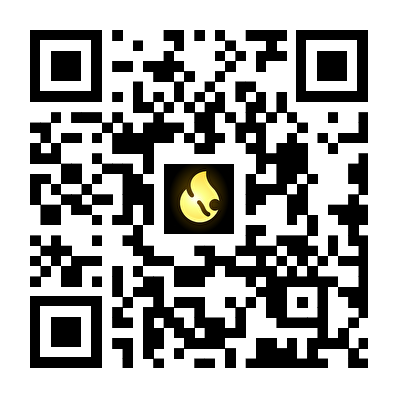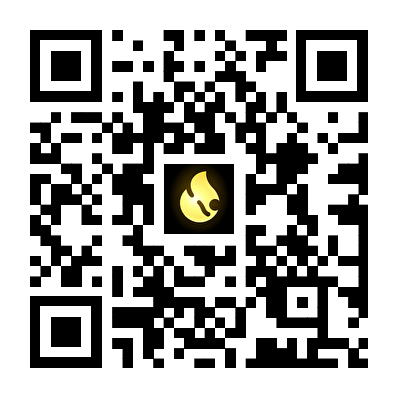In modern times, maintaining health can be challenging as one attempts to balance work and social life. This is why being aware of your calorie consumption requires an application with automated detection, barcode scanning, and meal analysis. These applications can provide reminders to eat healthier, keep oneself hydrated, and follow innovative recipes.
Nevertheless, it may be hard to find the best app to track calories because some apps provide unreliable food records and inconsistent information. That's why, read this article and explore all the top-rated apps to calculate your daily calories.
In this article
Part 1. Top Features to Consider in the Best App to Track Calories
In case you are looking to find the best app for calorie counting, it is recommended to find out what key features are expected in that app first:
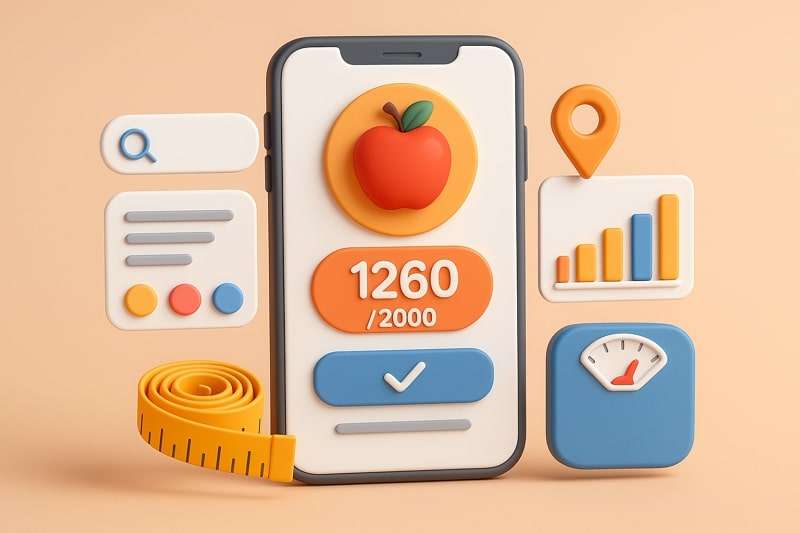
- Smart Nutrient Tracking: A practical calorie-tracking application must not only provide a simple count, but also offer a comprehensive view of nutrition. It should monitor over 80 micronutrients, electrolytes, and macronutrients, particularly in relation to specific health conditions.
- AI-Powered Food Recognition: Leading apps integrate AI technology to recognize meals instantly, log food journals, and deliver personalized nutrition advice and real-time calorie insights.
- Customizable Diet Goals: Users should be able to customize their calorie, macronutrient, and nutrient targets, as well as track their weight and other progress indicators.
- Extensive Food Database: A top calorie tracker should feature a vast, regularly updated food database with barcode scanning, brand listings, and the ability to add custom entries.
- Multi-Goal Support: Whether you want to lose weight, gain muscle, or maintain your fitness, advanced apps allow you to switch between goals without starting from scratch.
Part 2. 8 Best Apps to Track Calories on Android & iOS Devices
This part will help you go through all the best apps to calculate calories, so that you don't have to waste time trying every app you come across:
1. AI Calorie Counter - CalBye (Android/iOS)
If you want the best experience, an expert-level nutrient coach, and a calorie counter app, CalBye is your best bet. This AI app features a powerful food recognition system that can automatically identify all dishes and provide approximate calorie and nutrient information. It offers custom nutrition services tailored to your objectives, whether you aim for fat loss or muscle building.
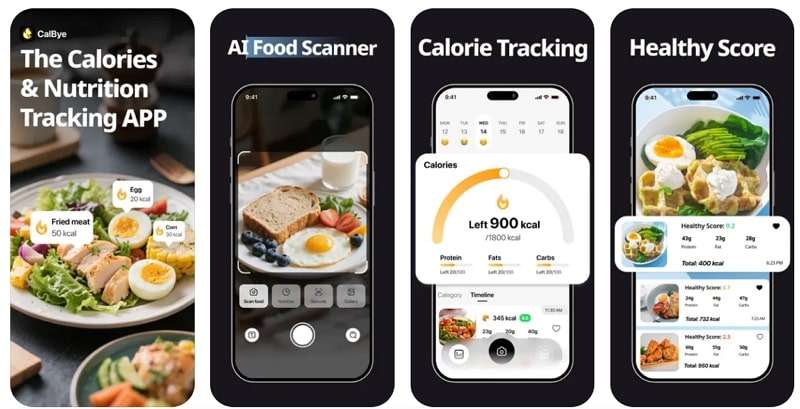
Moreover, you can receive personalized nutrient advice that will display exactly how your meals align with your objectives and allow you to adjust your meals. You can track your progress and watch the numbers change as you set goals and lose weight. Not only that, CalBye offers achievement badges that celebrate every progress or milestone you achieve.
Key Features
- Barcode Analysis: This feature enables users to scan the barcodes of various meals to access the corresponding nutrient information.
- Smart Goals: You can set different goals in terms of calories, macros, and weight, which the application will adjust and provide you with a personalized diet plan.
- Daily Progress History: With this app, you gain a more precise visualization of your nutrient intake, calorie balance, and long-term development on a daily, weekly, or monthly basis.

Simple Guide to Track Daily Calories Through CalBye
The following are the simple steps that can help you understand how this app works and offer you a complete calorie count:
Step 1. Access the Scan Mean Feature
After setting up the app, get started by pressing one of the "Just Scan Your Last Meal to get Going" options. When the following screen appears, hit "Scan Meal" to open the camera mode.
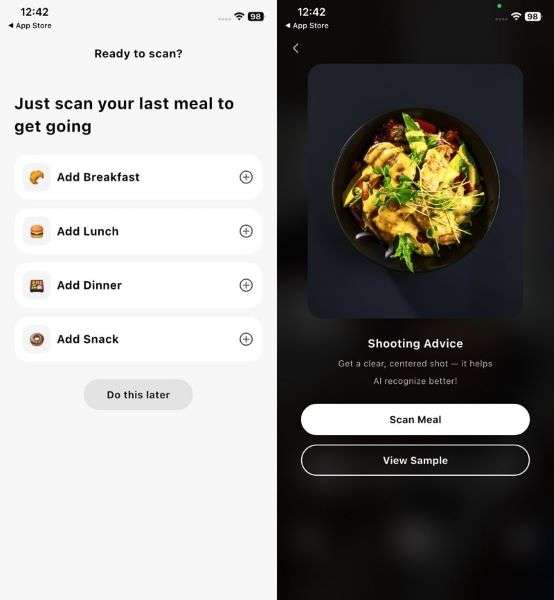
Step 2. Start the Scan Mean Process
From here, select the "Scan Meal" option, point your camera at the meal, capture the image of the food, and let the AI complete its analysis.
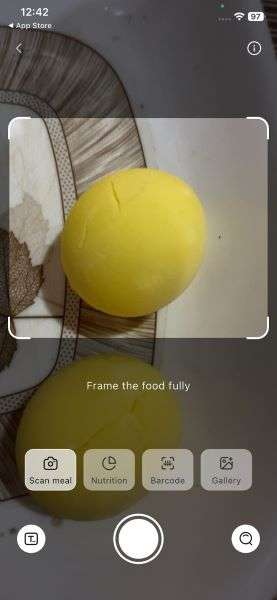
Step 3. Detailed Nutrient and Calorie Details
Once the analysis is complete, review your meal's detailed calorie breakdown, nutrient information, and personalized dietary advice, then choose the "Log it" option to save your entry.
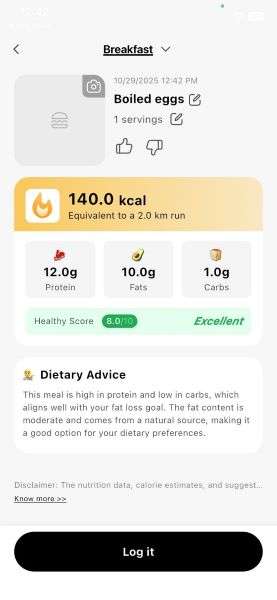
Real-Life Use Cases of CalBye
- Families Tracking Group Nutrition: Parents can track meals for family members separately, comparing calorie and nutrient data to encourage healthier eating habits for everyone at home.
- Individuals Improving Overall Meal Quality: Healthy-conscious users can view nutritional breakdowns for every meal to be aware of their vitamin and mineral intake while understanding which foods will help balance their daily intake of minerals and vitamins.
- Students Maintaining Energy and Focus: CalBye helps students create well-balanced meals to boost focus and productivity by tracking macros per day and reminding them to eat regularly during study sessions.

2. MyFitnessPal (Android/iOS)
Another excellent app for calorie counting, MyFitnessPal, features a vast food database and barcode scanning capabilities. It offers extensive customization options for diet and fitness objectives and is compatible with numerous fitness applications. This platform also includes access to personalized recipes, macronutrient tracking, and real-time calorie monitoring.
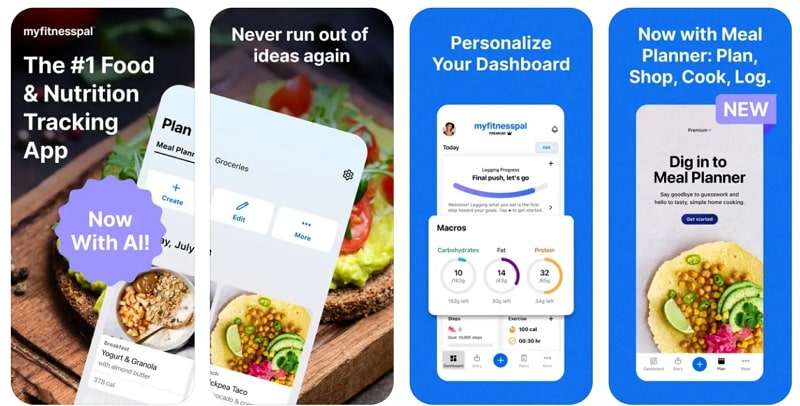
3. Lose It! (Android/iOS)
With this app, you can stick to your diet plans without losing any progress, as this app allows you to input your profile, dietary plans, and more. Its barcode reading and a big food database can assist you in obtaining an elaborate, nutritious, and calorie-detailed report. Furthermore, you will have access to tailored weight loss options, challenges, and goal tracking.
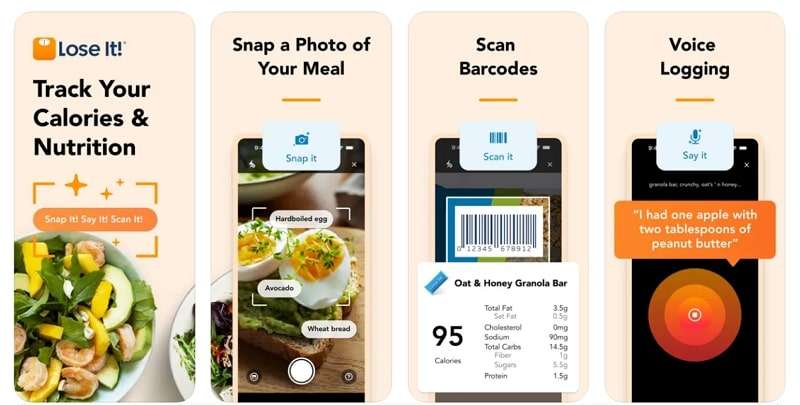
Limitations
- At times, the photo recognition feature shows less accurate data than other apps.
- The food database has duplicate or inaccurate entries created by users.
4. Cronometer (Android/iOS)
One of the best apps for tracking calories, Cronometer, is favored by users who prioritize accuracy and comprehensive nutrition tracking. Additionally, this calorie tracker provides detailed information on over 80 micronutrients. This AI-powered calorie tracker also features a verified and extensive database of food items, allowing for customization of dietary goals.
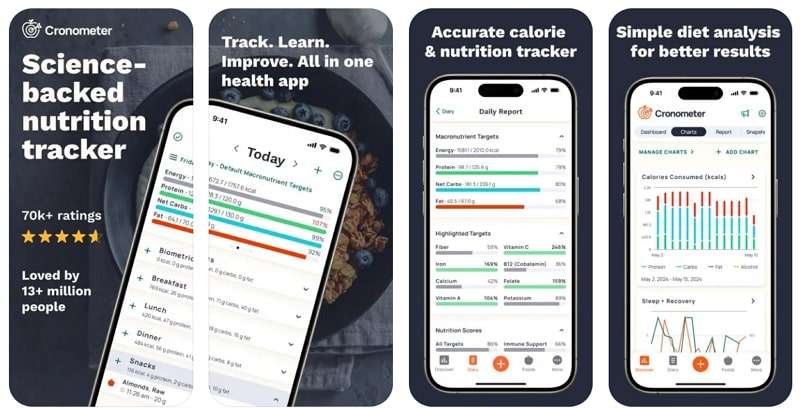
Limitations
- Advertisements appear in the free tier, which reduces the value of the user experience.
- The free version limits long-term nutrition reports to 7 days only.
5. Lifesum (Android/iOS)
Food tracking is also easier with the reliable Lifesum app, which can be integrated with Google Health to get a custom-made diet plan with calorie tracking. It also provides customized meal plans, recipes, and diets based on the user's goals and preferences. Besides, its hands-free logging, barcode scanning, and food rating will make your diet experience unparalleled.
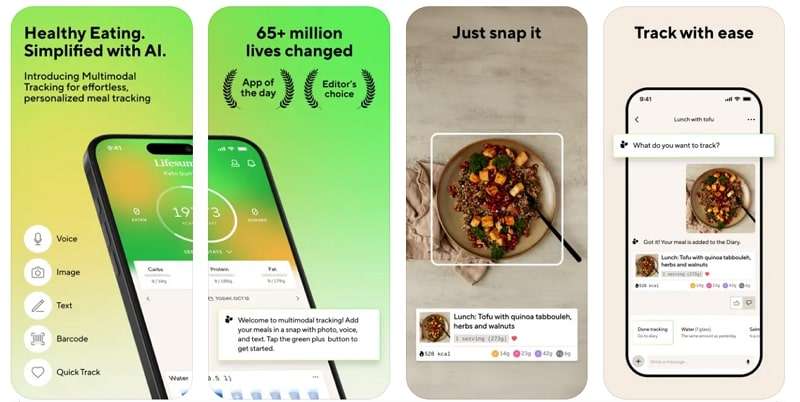
Limitations
- AI food logging can misread entries and estimate portions poorly.
- Pre-loaded diet plans promote restrictive eating patterns for some users.

6. YAZIO (Android/iOS)
YAZIO is also considered the best app for tracking calories, as it offers individual plans for weight loss, fasting, and muscle building that include calorie counting. What sets YAZIO apart is its fasting timer, healthy recipe library, and visual progress charts, which make it easy to track daily habits and stay motivated.
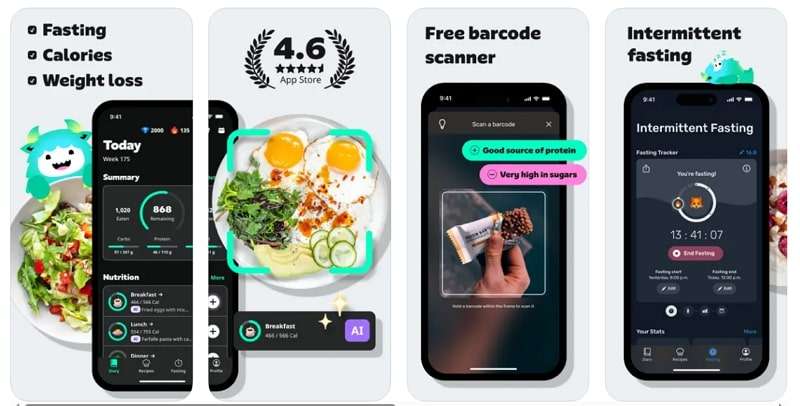
Limitations
- The food database may not recognize local food.
- Calorie count can be inaccurate due to regional limitations.
7. FatSecret (Android/iOS)
Using this straightforward app, which provides calorie counting, meal logging, and exercise tracking, makes it a better option for beginners. It includes a barcode scanner and weight tracking, so that you're aware of the calorie and nutrient count before buying any food item. Additionally, this app prioritizes privacy and simplicity while providing a comprehensive food database.
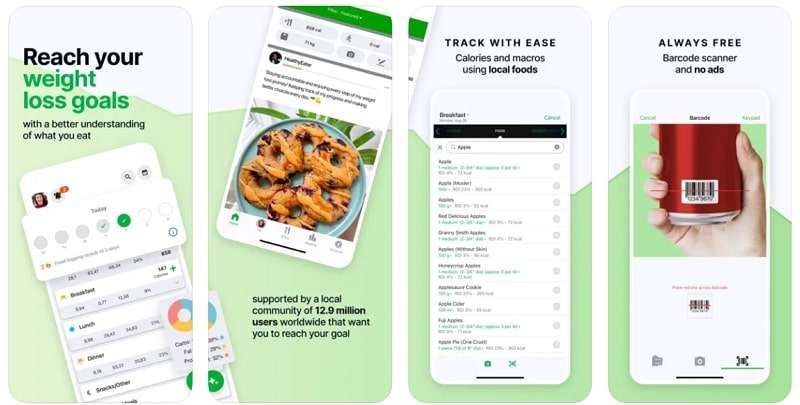
Limitations
- Micronutrient tracking is limited for some foods in non-US regions
- The food entry interface can feel clunky and slow for frequent users.
8. MyNetDiary (Android/iOS)
When exploring the best apps to track food calories, MyNetDiary stands out for its accuracy and ease of use. It allows barcode or voice meal logging with instant nutrition insights. The app also offers personalized recipes, adjustable diet plans, and progress tracking tools. It syncs smoothly with Apple Health and Google Fit, allowing users to maintain consistency and achieve long-term wellness effortlessly.
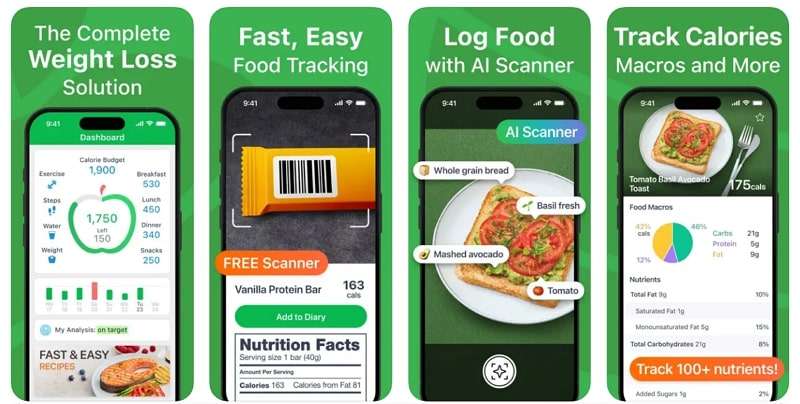
Limitations
- Learning curve may be steep for beginners unfamiliar with macros.
- Device and wearable syncing is only fully available with a paid plan.
Part 3. Tips to Maximize the Best Apps to Track Calories Every Day
After using the best apps to calculate calories, it is time to find out the tricks and tips that can give you the best out of the calories:
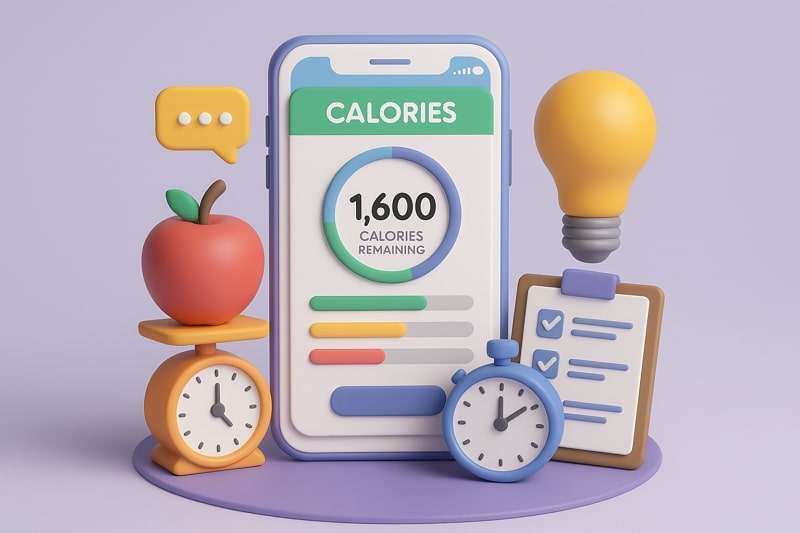
- Realistic Goals: Before you begin logging, set realistic calorie and nutrition goals that are appropriate to your level of activity. Many apps use AI to set these goals, so you do not over- or under-cut your calorie intake.
- AI Recommendations: Modern AI-powered calorie trackers provide intelligent meal suggestions and personalized nutrition guidance. They all come in handy to balance macros and suggest healthier alternatives based on your eating lifestyle.
- Modify Portion Sizes: Portion sizes should be adjusted according to the individual's height, weight, and dietary plan. This would make your calorie counting more significant than having food at any time.
- Monitor Beyond Calories: Apps can track macronutrients, fluid intake, and exercise to provide a comprehensive view of your overall health. Focusing on balanced nutrition results in sustainable outcomes, not just calorie management.
- Reminders and Streaks: Set daily reminders to track your meals and water intake. Most apps often appreciate consistency in the form of streaks or badges, which serve as little motivators to develop long-term habits.
Conclusion
Ultimately, this article highlights the significance of calorie counting and tracking habits by utilizing the most effective apps for calorie tracking. You've explored the top 8 calorie-counting apps that work on both Android and iOS devices. Despite their differences, users can confidently rely on Calby for precise, AI-driven nutrition tracking and sustainable, health-focused dieting.

FAQs
-
What diets or eating plans do these apps support?
Most apps allow for certain dietary flexibility, such as keto, intermittent fasting, low-carb, and many more. You can even create your custom meal plans to reach desired targets, choosing nutrition priorities and health goals. -
Is calorie counting suitable for everyone?
While calorie tracking can be a good way to manage one's weight or to maintain health, it may be a chore or trigger negative behaviors for some users. It's all about using apps responsibly and seeking professional advice for clinical purposes, such as calorie tracking and in cases of eating disorders. -
How do calorie tracking apps handle privacy and personal data?
These apps collect sensitive information, such as eating habits, health metrics, and location, to provide you with a personalized dietary plan. But what you need to know is that many of them sell data to third parties, for analytics or advertising purposes. -
Do all calorie-tracking apps collect the same type of data?
No, data types are application-specific, ranging from simple calorie and exercise trackers to those that track detailed biometrics and behavioral data. Users should audit for permissions and remove access to data that is too general.


